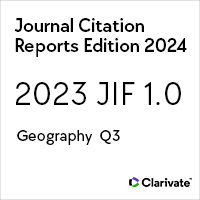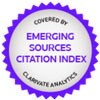El fenómeno de frontera y sus variables. Notas para una tipología
El fenómeno de frontera y sus variables. Notas para una tipología
https://doi.org/10.21670/ref.1997.40.a01
Palabras clave:
Tipologías, Clusters, FronteraResumen
Las fronteras han sido y son tan diversas que resulta conveniente la elaboración de tipologías que permitan la formación de conjuntos o clusters relativamente homogéneos. Estas tipologías favorecen el análisis comparativo y el mejor entendimiento de los casos particulares y del fenómeno en general. Se señalan algunas de las variables más significativas que intervienen en estos procesos, con especialreferencia a la América de habla hispana.Abstract National Boundaries have been and are so varied that is it helpful to create typologies which permit the formation of relatively homogenous groups or clusters. These typologies favor comparative analysis and a better understanding both of individual cases and of the general phenomenon. This article looks at some of the most important variables at work in these processes, particularly in the case of the Spanish-speaking countries of North and South America.
Citas
BILLINGTON, Ray Allen. 1966. Americas Frontier Heritage. Holt, Rine- hart, and Winston. Nueva York.
CÉSPEDES, Guillermo. 1983. América hispdnica, 1492-1898: Editorial Labor. Barcelona.
JIMÉNEZ, Alfredo. 1996. "El lejano norte esp3ñol: cómo escapar del American West y de las Spanish Borderlands", Colonial Latin American Historical Review, vol. 5, nÚID. 4:381-412.
a. Antropología hist6rica: la Audiencia de Guatemala en el siglo XVI. Universidad de Sevilla.
b. "La frontera en América: observaciones críticas y sugerencias", en Justina Sarabia Viejo et al. (eds.), Entre Puebla de los Ángeles y Sevilla. Estudios americanistas en homenaje al Dr. José Antonio Calder6n Quijano: 475-494. Escuela de Estudios Hispano- Americanos y Universidad de Sevilla. Sevilla.
KUTSCHE, Paul. 1983. "Borders and Frontiers" en Ellwyn R. Stoddard, et al. (eds), Borderlands Sourcebook. A GuideJo the Literature on Northern Mexico and the Southwest. University of Oklahoma Press, Norman, Oklahoma.
LOCKHART, J ~ e s y Stuart B. Schwartz. 1983. Early Latin America. A History 01 Colonial Spanish America and Brazil. Cambridge University Press.
MIKSELL, Marvin W. 1959. "Comparative Studies in Frontier History", Annals oi American Geographers, vol. 49:62-74.
POWELL, Philip Wayne. 1952. Soldiers, Indians, & Silver. The Northward Advance oi New Spain, 1550-1600. University of California Press.
TURNER, Frederick Jackson. 1894. "The Significance of the Frontier in American History", Annual Report oi the American Historical Association: 199-227. Washington, D.C.
WEBB, Walter Prescott. 1952. The Great Frontier. Houghton Mifflin Co. Boston.
WEBER, David 1. 1992. The Spanish Frontier in North America. Yale University Press.
WEBER, David 1. y Jane M. Rausch (eds.). 1994. Where Cultures Meet. Frontiers in Latin American History. Jaguar Books on Latín America, núm. 6. Scholarly Resources Books. Wilmington, Delaware.































